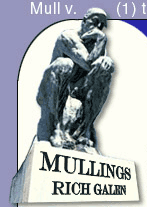|
|

|


Radioactive Reporting
Rich Galen
Friday March 18, 2011
Click here for an Easy Print Version
From Vero Beach, Florida
In September 1964 I showed up at a place called Marietta, Ohio to go to college. Among the 1,400-or so students who enrolled that semester, four of us became fraternity brothers, three of us were on the freshman crew and we have all remained friends for past 46+ years.
We are meeting this weekend for a non-event reunion. I only tell you this because if you don't hear from me Sunday night, you'll know why!
Now to the issue at hand: Plutonium.
Since the days of the Red Scare and Mutual Assured Destruction I have been told that Plutonium is the most toxic substance on earth.
Watching the breathless reporting from and about Japan, I suspect most of the anchors and reporters covering the nuclear plant story believe that as well.
It's not so. Inhaling Plutonium is not like getting a whiff of diesel fumes, but the long-held believe that the tiniest speck would lead to cancer is just wrong.
Which brings us back to the reporting from the heavily damaged Fukushima plant.
It's one thing for people like me to go on networks like CNN and spout off about the potential effects of some vote in the House, a statement by the President, or the results of a poll. It's something else when people who know no more than me go on the air a pretend to understand terms like half-life, isotopes, and LD50.
The New York Times' analysis of the situation in Japan yesterday began with this:
The first readings from American data-collection flights over the stricken Fukushima Daiichi nuclear plant in Japan show that the worst contamination has not spread beyond the 19-mile range of highest concern established by Japanese authorities.
Let's pull down that map of the world that hung over the blackboard in fifth grade.
Tokyo to Honolulu is about 3,800 air miles. Way, WAY more than 19.
Tokyo to Los Angeles is even farther. About 5,500 miles.
While we're doing mileage calculations, I find it interesting that the networks sent reporters to cover the power plant issues from Tokyo which is about 135 miles from Fukushima. That would be like sending a reporter to Springfield, Massachusetts to cover the Twin Tower attacks in New York City on 9/11.
I'm not suggesting that unless a reporter is standing in the path of a radioactive cloud, it doesn't count; I am suggesting that spending the money to send a reporter (and their hangers-on) Japan just to be able to put a bug on the corner of the screen that they are reporting LIVE FROM JAPAN only adds to the hype, but does nothing to increase knowledge.
A few people know what's going on in those reactors and none of them are talking to American reporters. A few more people know what the engineering issues are as they pertain to those reactors and most of them are in places like Washington, DC and Vienna (the home of the International Atomic Energy Agency).
If you want to follow the goings on in Japan, checking the IAEA website is much smarter than depending upon some off-camera producer's blog. As an example, this was on the IAEA's website last night:
"The situation at the Fukushima Daiichi nuclear power plants remains very serious, but there has been no significant worsening since yesterday."
Compare and contrast to MSNBC which, in the graf following their paraphrasing of the IAEA pronouncement, wrote about the work to pour water on the fuel rods:
"If the fuel is not fully covered, rising temperatures and pressure will increase the chances of complete meltdowns that would release much larger amounts of radioactive material than the failing plant has emitted so far."
And, if an asteroid should hit the earth in the vicinity of that nuclear plant that would be really, really bad.
I have no idea what is going to happen at that damaged facility. I also have no idea, when the situation is finally brought under control, whether any design, engineering, and/or construction flaws will be found.
I am pretty sure that the citizens of Honolulu and Los Angeles are in zero danger of being irradiated by the steam escaping from the Fukushima plant. Also, according to some studies plutonium is about as toxic as caffeine, but you'd have to drink 1,300 cups of coffee a day to get a lethal dose.
None of which makes for good copy, nor for good TV.
On the Secret Decoder Ring today: Links to the NY Times analysis, the IAEA site, the MSNBC coverage and one of the many pages which discuss the lethality of plutonium.
Also a Mullfoto showing the perfect way to start a vacation weekend and a Catchy Caption of the Day.
--END --
Copyright © 2011 Barrington Worldwide, LLC
Become a
Paid Mullings Subscriber!
(To join the FREE mailing list or to unsubscribe Click Here)

Current Issue |
Secret Decoder
Ring | Past
Issues | Email
Rich | Rich
Who?
Copyright �2007 Barrington Worldwide, LLC | Site design by Campaign
Solutions. | |
|


